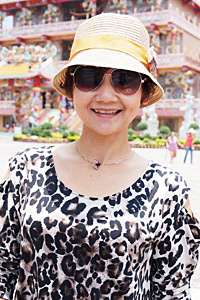As the political temperature in Thailand is rising again, with thousands of young people on the streets to voice their displeasure with the government, the country is looking for strong yet sensible leadership. I think all of you agree.
And while I don't intend to compare my home country with foreign nations where the political and social context is very different, I've been thinking about what happened in North Korea two weekends ago.
Yes, there was the expected military parade to mark the 75th anniversary of the ruling party, and of course the military showed off its biggest missile yet. But what got people talking was the sight of Kim Jong-un behaving in a way no supreme leader had dared to do before: emotional and apologetic to his people.
After paying tribute to troops for their response to national disasters and preventing a coronavirus outbreak, he apologised to citizens for failing to raise living standards. Mr Kim removed his glasses and wiped away tears as his voice trembled momentarily in a striking demonstration of contrition. This was a major departure from the usual bellicose rhetoric glorifying the Workers' Party.
"Our people have placed trust, as high as the sky and as deep as the sea, in me, but I have failed to always live up to it satisfactorily," he said, according to a translation of his comments in the Korea Times. "I am really sorry for that."
The audience also shed tears as they listened. For the first time, I too saw the human side of this young, charismatic leader.
While some observers including myself remain sceptical about Mr Kim's "apology", other analysts see his emotional expression as an indication of mounting pressure on his regime.
In the face of the pandemic, North Korea's trade with China -- by far its biggest economic partner -- has plunged due to the closure of borders since January, although Pyongyang insists it has not recorded a single case of the virus. Years of international sanctions in response to Pyongyang's nuclear programme, plus damage inflicted by natural disasters, have only added to the difficulties the country faces.
While Mr Kim avoided direct criticism of Washington, a US official said it was "disappointing" that North Korea was continuing to prioritise missile development while talks with the US remained deadlocked.
In America, meanwhile, President Donald Trump is recovering from Covid-19 and back on the campaign trail as he seeks to close the gap with rival Joe Biden before the Nov 3 election. Last Monday he strode onto the White House balcony and theatrically pulled aside his face mask as he prepared to address a few hundred fans standing on the lawn below.
To me, this is not something a responsible leader should do, though it's hardly surprising given Mr Trump's desire to convince the general public that he is in a good health.
The US tops the world in Covid infections with nearly 8 million cases and over 217,000 deaths. Mr Trump has largely spurned wearing a mask and has criticised others, including Mr Biden, for doing so. Meanwhile, he presides over a White House where senior aides, staffers, secret service personnel and others have routinely rejected mask use throughout the pandemic.
Now we have seen the consequences: More than 30 people in and around the White House have tested positive for Covid-19; even Mr Trump's 14-year-old son Barron had caught the virus, his mother revealed last week.
Mr Trump's diagnosis put the pandemic back at the centre of the 2020 campaign and gave Mr Biden an additional opportunity to hammer the president, while wishing him a speedy recovery, for failing to establish a national strategy for conquering the fast-spreading disease.
Returning our attention to the home front, the public is on edge as it waits to see how the latest round of youth-led protests, and the authorities' response, plays out. The rallies began just a day after Thais paid homage to His Majesty King Bhumibol Adulyadej The Great on the fourth anniversary of his passing last Tuesday. Under his guidance, Thailand passed through numerous crises in the past.
Clearly, the protesters are not backing off their demand for Prime Minister Prayut Chan-o-cha to step down. And while the rule of law has to apply, the premier himself should take centre stage in calming the public and restoring peace. Using force and state orders to disperse gatherings is not the way out of this turbulent time.
